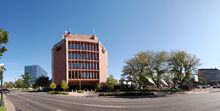KLZ-TV, virtual and VHF digital channel 7, is an ABC-affiliated television station licensed to Denver, Colorado, United States. The station is owned by the Dallas-based Belo Corporation. KLZ-TV's studios are located on East Speer Boulevard in Denver's Congress Park neighborhood, and its transmitter is located atop Lookout Mountain, near Golden. On cable, the station is available on Comcast Xfinity in standard definition on channel 7, and in high definition on digital channel 652.[1] It is also carried on CenturyLink Prism channels 7 and 1007.[2]
KLZ operates digital translators KZCO-LD (channel 17) in Denver and KZFC-LD (channel 26) in Windsor, which allow homes with issues receiving KLZ's VHF signal or only a UHF antenna to receive KLZ in some form. The station's second digital subchannel, which serves as a Court TV Mystery owned-and-operated station, is relayed on analog translator KZCS-LP (channel 23) in Colorado Springs.
History[]
As a CBS affiliate[]
The station first signed on the air on November 1, 1952 as KLZ-TV.[3] It was founded by the Oklahoma City-based Oklahoma Publishing Company (operated by Edward K. Gaylord), which also owned KLZ radio (560 AM and 106.7 FM, now KWBL). KLZ-TV immediately took the CBS affiliation from KBTV (channel 9, now KUSA), owing to KLZ radio's longtime affiliation with the CBS Radio Network. In 1954, Gaylord sold the KLZ television and radio stations to Time-Life.[4] The station's original studio facilities were housed in a renovated former auto dealership on the east side of the block at East 6th Avenue and Sherman Street. Channel 7 moved to its present studio facilities, an eight-sided, five-story building called "The Communications Center," on the intersection of Speer Boulevard and Lincoln Street in 1969.

The taping of a religious public affairs program at the station in 1968.
Time-Life sold the station to McGraw-Hill in late October 1970, in a group deal that also involved the company's other radio and television combinations in Indianapolis, San Diego and Grand Rapids, Michigan; and KERO-TV in Bakersfield, California.[5] Despite the Federal Communications Commission's new restrictions on concentration of media ownership that went into effect shortly afterward, McGraw-Hill was allowed to keep the KLZ radio stations via a cross-ownership waiver; however, it was also required to sell their sister radio properties in Indianapolis, San Diego and Grand Rapids to other companies. Time-Life would later purchase WOTV (now WOOD-TV) in Grand Rapids in the final deal. By the time the sale was finalized in June 1972, the purchase price for the entire group was just over $57 million. WFBM-TV (now WRTV) in Indianapolis, KERO-TV in Bakersfield and KOGO-TV (now KGTV) in San Diego were retained by McGraw-Hill, along with the KLZ radio and television cluster.[6] The 1990s did not begin well for KLZ; the station saw significant overall financial losses in 1990 and 1991, as well as a decrease in viewership for its local newscasts. A new management team introduced in 1991 turned things around at KLZ; net profit soared 105.5% in 1992 as a result.[7]
Switch to ABC[]
Although KLZ had been one of CBS' stronger affiliates, the station would end up disaffiliating from the network due to a series of events that were set in motion as a result of CBS' partnership with the Westinghouse Electric Corporation in July 1994 (and the network's eventual merger with that company in August 1995).[8][9] As part of the deal (which involved CBS gaining affiliations with two Group W-owned stations in Boston and Baltimore), the network moved its programming from its owned-and-operated station in Philadelphia, WCAU-TV, to Westinghouse's KYW-TV. In a complex ownership deal that was announced in November 1994, CBS traded WCAU to NBC in exchange for two of that network's O&Os (then longtime affiliates)—Denver's KOA-TV (which had been an O&O since the station's then-owner General Electric purchased NBC in 1986) and Salt Lake City's KUTV (which the network had acquired less than one month earlier). CBS then formed a joint venture with Westinghouse that assumed ownership of KYW-TV, KOA and KUTV, with Westinghouse serving as majority owner. Group W/CBS and NBC also swapped the transmitter facilities—and by association, channel frequencies—of their respective stations in Miami, WCIX (now WFOR-TV) and WTVJ.[10]

A shot of the Denver7 (KLZ-TV) studios, taken from East Speer Boulevard.
At the same time, McGraw-Hill had struck an affiliation agreement with ABC, due partly to the fact that its stations in San Diego and Indianapolis had already been aligned with the network (Bakersfield sister station KERO-TV was also involved in the deal between McGraw-Hill and ABC; however, that station had to wait for its affiliation contract with CBS to expire in March 1996, before it could finally switch to ABC; the station would rejoin CBS in 2008 when ABC purchased its former Bakersfield affiliate KBAK-TV). In keeping with all of this, each of the three major broadcast networks relocated their programming to different stations in the Denver market on September 10, 1995; ABC moved its programming to KLZ from KUSA, with KLZ's outgoing CBS affiliation going to KOA and NBC moving from KOA to KUSA.
On January 11, 2009, McGraw-Hill announced that it would exit from the broadcasting industry and put its entire television station group up for sale;[11] on June 3 of that year, the company announced that it had entered into an agreement to sell the eight-station broadcasting division to the Belo Corporation.[12] The FCC approved the sale on July 10, 2009, and the deal was officially completed on August 9, 2009.[13] On May 7, 2019 KMGH dropped Azteca América and replaced it with the Escape network (now Court TV Mystery), which moved over from KTFD-TV.